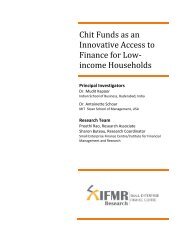Government of India Volume I: Analysis and Recommendations
Government of India Volume I: Analysis and Recommendations
Government of India Volume I: Analysis and Recommendations
Create successful ePaper yourself
Turn your PDF publications into a flip-book with our unique Google optimized e-Paper software.
SYSTEMIC RISK<br />
Table <strong>of</strong> <strong>Recommendations</strong> 9.8 Counter-cyclical capital measures<br />
◮ The FSDC must conduct research <strong>and</strong> formulate a mechanism for the implementation <strong>of</strong> a counter-cyclical<br />
capital buffer such that it is applicable to the entire financial system, or large parts <strong>of</strong> the financial system;<br />
◮ The counter-cyclical capital buffer will be applied at the level <strong>of</strong> the entire financial system, or to large parts<br />
<strong>of</strong> the financial system, as appropriate;<br />
◮ The FSDC will make the decision to increase capital requirements when systemic risk is building up, <strong>and</strong> decrease<br />
such requirements, <strong>and</strong> free capital when the system is under stress;<br />
◮ Decisions <strong>of</strong> the FSDC will translate into action through co-ordinated regulations issued by the respective<br />
regulatory agencies with identical effective dates; <strong>and</strong><br />
◮ The FSDC will continue to conduct research on other measures. Once the FSDC is satisfied regarding the applicability<br />
<strong>of</strong> a measure, drawing on both international experience <strong>and</strong> original research in <strong>India</strong>n settings,<br />
the Ministry <strong>of</strong> Finance will propose amendments to the appropriate sections <strong>of</strong> the draft Code pertaining to<br />
systemic risk, in Parliament.<br />
Table <strong>of</strong> <strong>Recommendations</strong> 9.9 Aspects <strong>of</strong> inter-regulatory agency co-ordination<br />
◮ Promoting formal co-ordination mechanisms amongst regulatory agencies;<br />
◮ Coordinating the conduct <strong>of</strong> systemic-risk monitoring functions;<br />
◮ Facilitating the adoption <strong>of</strong> common st<strong>and</strong>ards <strong>and</strong> practices in rule-making <strong>and</strong> enforcement;<br />
◮ Coordinating with international organisations <strong>and</strong> multilateral bodies in conjunction with the Ministry <strong>of</strong> Finance;<br />
<strong>and</strong><br />
◮ Helping to resolve inter-regulatory agency disputes.<br />
system <strong>and</strong> devise new measures (based on international best practices where appropriate).<br />
To this end, the Commission recommends that the Central <strong>Government</strong> should<br />
undertake a formal review <strong>of</strong> this issue in five years.<br />
9.8. Inter-regulatory agency co-ordination<br />
The institutional arrangement <strong>of</strong> the FSDC brings together multiple regulatory perspectives<br />
which are essential to identifying market trends that can result in systemic risk. The<br />
Commission believes that the FSDC can further promote co-ordination <strong>and</strong> consultation<br />
by initiating measures like the establishment <strong>of</strong> joint working groups, cross-staffing initiatives,<br />
designated points <strong>of</strong> contact for inter-regulatory communication, resolution <strong>of</strong><br />
disputes <strong>and</strong> other such mechanisms between member-regulators.<br />
The board <strong>of</strong> the FSDC will engage in resolving regulatory disputes amongst members<br />
<strong>of</strong> the FSDC <strong>and</strong> between members <strong>and</strong> other regulatory agencies, if required. The<br />
board <strong>of</strong> the FSDC will be empowered to determine its own procedure for resolution <strong>of</strong><br />
the dispute, in line with the principles <strong>of</strong> natural justice.<br />
The FSDC will also work with member-regulators to help in identifying <strong>and</strong> reducing<br />
regulatory uncertainty. In order to reduce regulatory uncertainty, the FSDC will promote<br />
consistency in the principles <strong>and</strong> practices adopted by its member-regulators in the areas<br />
<strong>of</strong> rule-making <strong>and</strong> enforcement. Such efforts will enable better resolution <strong>of</strong> conflicts<br />
between the policies <strong>of</strong> the members <strong>and</strong> promote cohesive oversight <strong>of</strong> the financial<br />
system.<br />
The Commission wishes to emphasise that any action <strong>of</strong> the FSDC in this regard will<br />
not interfere with the functioning or the primary regulatory m<strong>and</strong>ate <strong>of</strong> the regulators.<br />
Table 9.9 summarises the envisioned approach to inter-regulatory co-ordination.<br />
9.9. Crisis management<br />
Despite the best efforts at avoiding systemic crises, there is a possibility that some crises<br />
may occur. Crisis management requires extraordinary co-operation between the various<br />
FINANCIAL SECTOR LEGISLATIVE REFORMS COMMISSION 97



